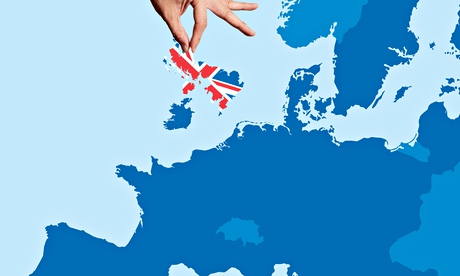Michael White, Larry Elliott & Charlotte Higgins: “What if Britain left the EU?“, The Guardian, 04 Νοεμβρίου 2014.
Budget rows, referendum pledges, Ukip on the rise … is Britain heading for an EU exit? It would certainly be a messy divorce after 44 years. But what would it mean for our politics, prosperity and cultural life?
Politics: How would Europe regard Britain’s retreat? With disappointment and anger
In a rare uncalculating moment, Boris Johnson wrote last year that, if Britain finally ended its “sterile debate” over Europe by leaving the EU, it would quickly discover “that most of our problems are not caused by Brussels, but by chronic British short-termism, inadequate management, sloth, low skills and a culture of easy gratification and under-investment”.
How true, but that discovery would not be the end of the matter if David Cameron’s promised in/out referendum in 2017 resulted in a Brexit majority. The euphoria that half the population of Scotland came close to feeling in their own independence referendum last September would rapidly dissipate as familiar problems resurfaced and new ones popped up.
Into the unknown: what happens if the UK is no longer connected to our European neighbours? Photograph: Guardian
The country would be divided – literally so if Scotland took its cue to do a Scexit and stay in the EU, generating tensions in Northern Ireland, though probably not in Wales. The defeated minority would be frightened and sullen, assorted dreamers and zealots would rush to start creating their vision of a restored Merrie England. Or of an offshore free enterprise hub, the Hong Kong of the Atlantic, as much a fantasy as the socialist and green republic that would be sought by others.
Everyone would claim copyright on Blake’s Jerusalem and political parties would scramble to adjust to the new realities. After 44 years of half-hearted membership, there would be no going back, but a lot of time-consuming unbundling would need urgent attention, with new treaties negotiated to project essential national interests, much as the famously independent Swiss and Norwegians spend time negotiating in Brussels.
If the Scottish parallel is any guide, Ukip would enjoy an SNP-style surge of popularity, claiming the credit for forcing the Tories – would Cameron still be leader, or would Mayor Johnson move in for the kill? – to make good their pledges. Whether they recommended yes or no in 2017, the Tories would be seen to have messed things up: neither Cameron nor George Osborne actually want to leave.
It is hard to see such a vote doing Labour, the pro-EU party since its mid-80s U-turn, much good. Ukip’s new recruits are becoming more sophisticated, but Nigel (“Mine’s a pint”) Farage is not likely to be up to the task: the technocrats in Whitehall and perhaps the City would have to sort out the messy, bitter divorce as best they could.
Σχετικές αναρτήσεις:
- Salamone, A. (2014) “Britain’s EU membership hangs by one less thread“, Britain’s Europe Blog, 27 Οκτωβρίου.
- El Sehrawey, A. (2014) “Book Review: The Europe Dilemma: Britain and the Drama of EU Integration by Roger Liddle“, LSE EUROPP, 21 Ιουλίου.
- Policy Network (2013) “Britain’s Financial Services Industry in a Changing Europe“, A Policy Network Report for the City of London Corporation, 22 Νοεμβρίου.




